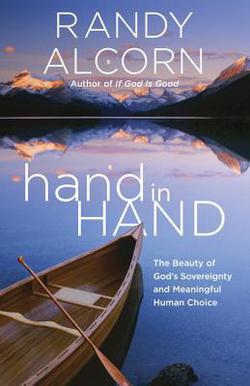 The debate over the sovereignty of God and the free will of man originally heated up between Augustine of Hippo and Pelagius in the 4th century. This debate has raged throughout church history and does not show any signs of letting up. Arminians accuse Calvinists of serving a “tyrant God” who plays the role of a puppet master, making free will an illusion. Calvinists accuse Arminians of serving a “timid God” who is weak at the knees.
The debate over the sovereignty of God and the free will of man originally heated up between Augustine of Hippo and Pelagius in the 4th century. This debate has raged throughout church history and does not show any signs of letting up. Arminians accuse Calvinists of serving a “tyrant God” who plays the role of a puppet master, making free will an illusion. Calvinists accuse Arminians of serving a “timid God” who is weak at the knees.
Hand in HAND by Randy Alcorn addresses the thorny issue of God’s sovereignty and the free will of man. Alcorn does not promise to end all arguments. But he does enter the ring as a sort of “theological referee.” The author is a former Arminian theologian who has since turned into a Calvinist. While Alcorn prefers to say that he is a 4 point Calvinist, since he is uncomfortable with particular redemption, he is committed to Calvinistic presuppositions. This theological shift allows the author to sympathize with Arminians and provide some good teaching points for Calvinists who tend to be overzealous.
Alcorn begins by reassuring readers that the subject should be discussed and notes six important reasons for pursuing the matter:
1. To develop a deeper appreciation for God and his Word, which reveals him to us.
2. To help us mirror Christ’s humility.
3. To embrace all of God’s inspired Word, not just parts of it.
4. To foster unity in the body of Christ.
5. To avoid fatalism and crushing guilt.
6. To prevent us from becoming trivial people in a shallow age.
The author surveys the biblical data which point to the biblical reality of God’s sovereign control over all things as well as human responsibility. He notes how these two realities intersect, creating a paradox not a contradiction.
One chapter is devoted to addressing the matter of Open Theism, a theological cousin of Arminianism which denies God’s definite foreknowledge of all things and affirms the libertarian free will of the creature. Alcorn makes it clear that both points are patently rejected in Scripture.
Several features make Hand in HAND a worthy book; a book that will likely win the Gold Medallion Award:
First, Alcorn writes with the proper tone and spirit. Much of the debate the occurs over these matters produce more heat than light. Dave Hunt’s Book, What Love is This is a good example of this mean-spirited approach which caricatures a given theological view. Alcorn approaches the subject with humility and gentleness and invites readers of differing opinions to pay careful attention to the arguments.
Second, misunderstood terms are clearly defined. The author does a good job of providing working definitions that are biblical and understandable. The clear terminology should help in future debates between Calvinists and Arminians.
Third, the lines of orthodoxy are clearly drawn. Both Calvinists are Arminians are included in the so-called box of orthodoxy. This point is of great value, especially when both schools of thought accuse each other of heresy. Alcorn invites both sides to engage in meaningful debate without name calling. Additionally, Alcorn rightly notes that Open Theism is outside of orthodoxy. Any theologian who refuses to grant God the ability to possess definite foreknowledge of all things has moved outside the perimeter of orthodoxy.
Fourth, a determinism continuum is presented. Sadly, many readers and students of theology are unaware of the theological landscape which includes many views concerning determinism and free will. The author clearly describes and defines these views: Hyper-Calvinism (outside orthodoxy), Compatibalism, Molinism, Libertarianism, and Open Theism (outside orthodoxy).
Fifth, Biblical Calvinism is presented correctly. Apart from the merits of particular redemption which could be debated at another time, the author does a terrific job of presenting Calvinism as a biblical system which is passionately God-centered; a system which promotes evangelism and engagement with culture. Additionally, the author demonstrates repeatedly that Calvinism embraces the notion of free will, (what Alcorn prefers to call “meaningful choice”) by pointing readers to the definition popularized by Jonathan Edwards – “choosing according to one’s strongest inclination.”
Sixth, all readers are admonished to trust a sovereign God. In what proves to be the best chapter in the book (chapter 10), the author encourages readers of all theological backgrounds to trust in a God who is sovereign.
Hand in HAND will not be received well by Open Theists and Hyper-Calvinists. Some Arminians and Calvinists may be bothered as well by some of the content. But as a pastor who has travelled a very similar theological path from Arminianism to Calvinism – and even attended the same Bible College, I trust that thousands of people will devour Hand in HAND in the days ahead. There is no doubt that Alcorn’s work will spark questions and stimulate debate. But my prayer is that the debate will produce more light than heat. And in the final analysis, people will be drawn closer to the Savior and bank on his all-sufficient grace. Indeed, he is sovereign over all!
5 stars